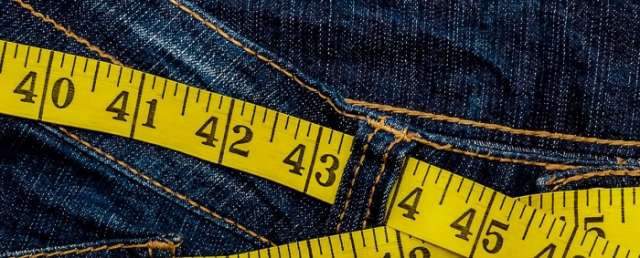Welcome to life without estrogen.
"Preclinical data has shown that either surgical menopause or declines in estrogen accelerates fat accumulation, primarily visceral or abdominal fat," said Dr. JoAnn Pinkerton, executive director of the North American Menopause Society. "Changes over time in how women look -- such as noticing more abdominal fat, having increases in waist size, pants no longer fitting in the waist or increases in breast size -- all may be signs."
Unfortunately, that extra fat can be life-threatening.
"A body fat percentage of 35% or more for postmenopausal women means a higher risk of obesity-related heart and diabetes risks," Pinkerton explained, "including higher total and LDL (bad) cholesterol and insulin resistance."
To combat those health risks, women are encouraged to eat healthy, watch their weight and exercise. Now, there may be another weapon in the arsenal: menopausal hormone therapy.
Fighting belly fat
Belly fat, along with hot flashes, night sweats, insomnia and irritability, is one of the many downsides of the end of a woman's menstrual cycles. Those symptoms can last for years as fertility shuts down; many women find it extremely difficult to cope. Doctors may offer artificial replacements of estrogen, progesterone or a combination, which is called menopausal hormone therapy (formerly hormone replacement therapy, or HRT).
A new study of more than 1,000 postmenopausal women, ages 50 to 80, found that those who were currently taking hormones had significantly lower levelsof tummy fat than women who had never used them.
"Up until now, there was not a large study focused on the fat in the abdomen, which is the most known detrimental fat in the body," said endocrinologist and study lead Dr. Georgios Papadakis of Lausanne University Hospital. "The new conclusion of the study is that menopausal hormone therapy prevents the increase of type of fat in postmenopausal women."
The study, published Tuesday in the Journal of Clinical Endocrinology and Metabolism, analyzed data from a large, ongoing study of heart disease in Switzerland called the OsteoLaus Cohort. In addition to asking women about their use of hormone replacement, the study measured body fat in a unique way.
Where fat goes when you lose weight
Instead of using height and weight to establish body mass index, each woman underwent a dual-energy bone x-ray to determine her level of body fat. The use of this tool was one of the study's strengths, said Pinkerton, who was not involved in the research. She considers it to be the gold standard to distinguish "abdominal fat from other components of fat tissue."
However, the study found that the beneficial effects on tummy fat didn't last. Once hormone replacement stopped, the women rapidly regained their abdominal fat.
This finding, Pinkerton said, is important for doctors when reviewing hormone replacement with their patients, especially when it comes time to stop.
"Discussions about stopping hormone therapy should include a discussion of increased gain of abdominal fat and the associated health risks," she said. It's one reason she feels this is a "very important study for menopausal women and their providers."
Another reason is that studies like this continue to add to the knowledge base on hormone replacement, helping reduce the fear that many women have about using hormones to treat their hot flashes and irritability.
Years of fear and confusion
"Many women who may benefit from hormone therapy have been denied safe and effective therapies because of fear generated from the initial reports from the large Women's Health Initiative Study," Pinkerton said.
The Women's Health Initiative Study was a long-term national study following 161,808 postmenopausal women, ages 50 to 79, at 40 medical centers across the United States. Launched in 1993, the study divided those women into one of four randomized trials: the effects of hormone therapy, dietary changes, calcium and vitamin D use, and an overall observational study.
The stated goal of the effort, funded by the National Heart, Lung, and Blood Institute, was to find ways to prevent heart disease, osteoporosis, breast and colorectal cancer in postmenopausal women. Though data collection stopped in 2005, extension studies have continued to follow the women, and numerous results have been published. According to the Women's Health Initiative website, the effort has changed the way we treat post-menopausal women and saved the United States $35.2 billion in direct medical costs.
The first results on hormone therapy, published in 2002, were shocking. Instead of the long-touted benefits of hormone replacement for women's health, especially heart disease, the study found that taking estrogen plus progesterone replacement hormones actually increased a woman's risk of heart disease, stroke and invasive breast cancer.
The effect was immediate: Millions of women stopped taking the therapy, and millions more were confused about what to do to help their menopause symptoms.
A second study, published in 2004, found that taking estrogen replacement alone, without progesterone, was linked to increased risk of dementia, stroke and other health issues. It did, however, decrease the risk of hip fracture.
As it turns out, the published results from those two studies didn't tell the whole story.
Critics say the initial reports did not "put the data in clinical perspective" by failing to point out that most of the women were much older, well past the age of initial menopausal symptoms. More criticism: The benefits for fracture prevention were undervalued, and the studies were not given in-depth reviews or critiques before they were published.
In 2013, the Women's Health Initiative published a comprehensive review of all of the data in the hormone studies. The recommendations took into account age and length of time from starting menopause. They said that although women should not use hormone replacement to reduce the risk of any chronic illness, it's perfectly acceptable for younger women, between 50 and 60, to try it to ease their transition into menopause.
CNN
More about: bellyfat
















































